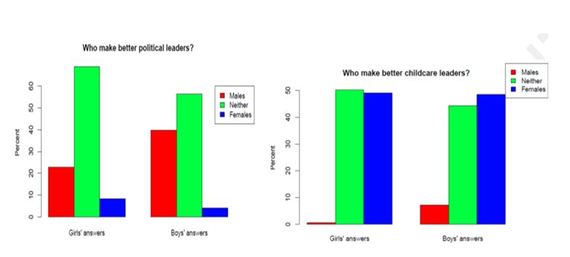Most everyone remembers the #LikeAGirl campaign and video that showed us how people perceive girls compared to boys.
Making Caring Common (MCC), a project of Harvard School of Education, surveyed nearly 20,000 students from a diverse range of middle and high schools to raise the awareness of gender bias. "Leaning Out: Teen Girls and Leadership Bias" revealed that a majority of students are against female leaders.
Many Boys and Girls Expressed Bias Against Girls as Leaders in Powerful Professions
•Twenty-three percent of girls preferred male political leaders (eight percent preferred female and sixty-nine expressed no preference).
•Forty percent of boys preferred male political leaders.
•Thirty-six percent of boys preferred male business leaders and girls were slightly higher.
With a presidential election fast approaching with candidates to potentially become the first female president, these findings are a bit concerning. Children are usually influenced by their parents and their surroundings. This means it might be time to check in on your own biases. This is not a political issue, this is a gender issue. No matter who is running for any leadership position, the competitors should be judged objectively and equally, regardless of gender, and parents need to discuss this with their children.
When the same students were asked about how they view women leaders in traditionally female professions, such as childcare directors or art directors, forty-nine percent felt girls were more capable than boys. What does this say about gender bias? Is this common in your home?
Another key finding:
Students Were Least Likely to Support Granting More Power to White Girls as Council Leaders
As many parents believe that their children are being raised with acceptance and tolerance to all races, it is obvious that appearances matter.
Although white girls tended to support student councils led by white boys over white girls, white girls who perceived high levels of gender discrimination at their schools showed greater preference for female-led student councils.
When it comes to leadership, white teen girls also appeared to have biases against each other. The gap between white boys and white girls appears to be largely explained by the fact that white girls tended not to support giving more power to councils lead by white girls.
Richard Weissbourd, co-director of Making Caring Common and a faculty member of Harvard Graduate School of Education says:
"Our study points to insidious bias against girls as leaders that comes from many and unexpected sources. Bias can be a powerful -- and invisible -- barrier to teen girls' leadership. Yet parents and teachers can do a great deal to stem these biases and help children manage them."
Our youth today spend about ninety-two percent of their time connected online, and adults spend about seventy-four percent, according to recent PEW Research studies.
No one is disputing cyber-time, what we need to be concerned about is what we are reading online when it comes to the female gender. Could it possibly be causing a negative stigma when it comes to determining leadership skills or someone's strength?
Let's be honest. When we discuss the following topics they are usually related to girls or women:
•Slut-shaming
•Fat-shaming
•Face-shaming
•Mom-shaming, gossiping and judging
•Toddler-shaming
•Teacher Shaming (usually female)
•Revenge porn
•Cyberstalking
I am not saying that males are not victims, they are. I would never diminish a male victim; however, the headlines related to women that have been under attack seem to be overwhelming.
Do these frequent headlines weaken the female gender?
Sadly, we hear about female students being raped on college campuses too frequently. The Bill Cosby saga continues without closure for the alleged victims and their stories of defeat persist. It's all too common to see men comment with rape threats on social media when they don't like something a woman says. Again, women are the main victims.
Does this weaken the female gender?
Dr. Michele Borba, parenting expert and author, says: "We all have a part to play in creating a culture in which girls can reach their full potential."
Dr. Borba's question for parents and educators today is: "How can we support girls in overcoming these barriers?"
Laci Green, YouTuber and video-blogger hosts an online sex education series of videos through her YouTube Channel on behalf of Planned Parenthood and Discovery News. She offers a bold take on gender bias, and with over a million subscribers, teens obviously relate to her message.
In one of her videos, Green addresses dress code sexism in schools and how they target girls -- specifically. It shows how dress code guidelines can be double-standards, again helping us to better understand how the female gender is consistently coming up short on positive self-image.
What can you do to help support girls in today's society?
Like with everything, keep in mind you are the role model for your children. If you're biased, it will likely rub off on your kids.
Don't just let boys be boys, it's time to say enough is enough when boys make remarks about girls and parents make excuses -- "they're just being boys." Excusing wrong behavior sends the message that the demeaning behavior is acceptable. Take time to consider how to intervene and step in immediately if you observe negative behavior.
It's no different when it comes to our language both online and offline. When you are speaking to your children about careers, don't use stereotypes.
For example use gender-neutral words like "firefighter" instead of "fireman" or "police officer" instead of "policeman." Girls need to understand they have the ability to be whatever they want to be, just as boys can become nurses or flight attendants.
It's time to put gender bias in the history books.
Takeaway tips
•5 ways to support gender equality on a daily basis.
•Encourage girls to become involved in leadership opportunities.
•Mix up chores at home. Boys can do dishes and girls can mow the lawn.
